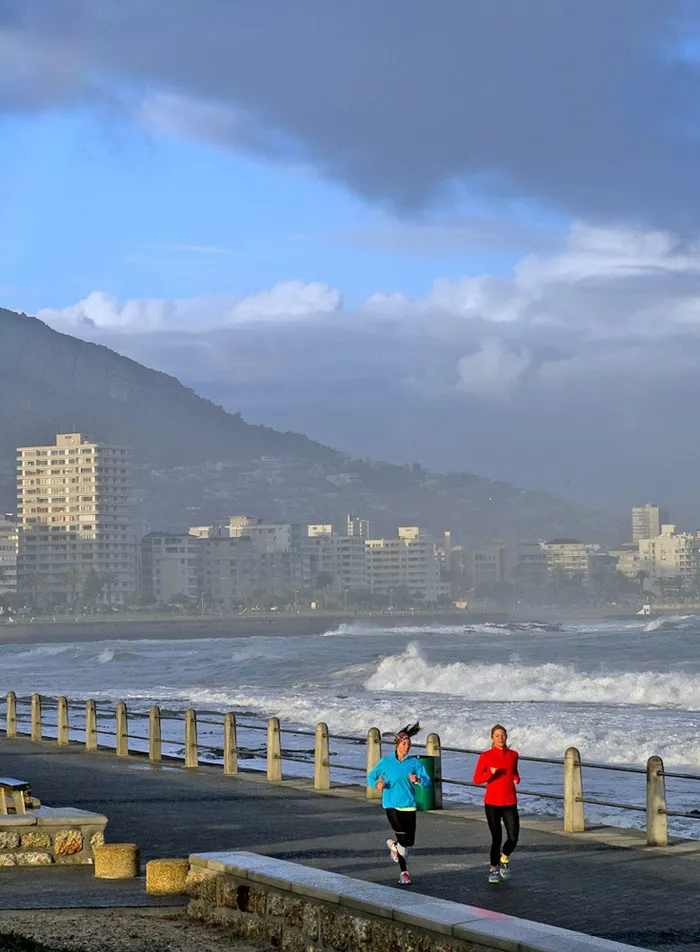Africa-focused movement aims to use running teams to measure air quality

Africa-focused movement aims to use running teams to measure air quality. Picture: Henk Kruger.
Cape Town - Powered by the passion for running and the environment, an Africa-focused global movement is harnessing the power of the youth in order to help improve the air quality of cities across the continent.
Conceptualised by public health physician and urban epidemiologist Tollulah Oni, the Cityzens for Clean Air campaign is seeking to amplify young voices by having run groups led by run leaders that will capture information about the air quality and features of different city neighbourhoods that make it easy or more difficult to run.
Building the momentum towards COP27 in November, this information will then be used to design youth-led advocacy tools and tactics in hopes of spreading the activation across the continent, advocating for healthy climate-resilient public spaces in urban cities.
Oni said that given that the climate crisis is a health crisis, she noticed how urban residents are disproportionately impacted by climate-induced disruptions and felt that something needed to be done.
“I’m a runner. I run wherever I go as a way to get to know the city. And in many cities in South Africa and Africa that I ran through, I started noticing that people were claiming public space for physical activity in ways that sometimes posed risks to their health. In particular, I noticed people running in places with high levels of air pollution and high risk of injury. So, as a public health doctor, I was conflicted.
“While it was great to see people running and exercising in public space, I realised that despite the fact that the air we breathe is so critical to our health, air pollution has been essentially normalised in many cities, often perceived as the norm. As a result, air quality was often not measured, and many people were not aware of the many different ways that air pollution impacts health, e.g. increasing the risk of strokes, premature births, and negatively impacting cognitive development of children.
“So I thought, what if we harnessed the young demographic on our continent to raise awareness of the fact that air quality is a critical ingredient in creating healthy climate-resilient cities, and have youths shape efforts to raise awareness of the importance of measuring air pollution so that we can have a better understanding of where to target interventions and to be able to know how interventions improve air quality and health,” said Oni.
Biostatistician at UrbanBetter and chief of staff for the Cityzens for CleanAir Campaign, Monika Kamkuemah, said that seeing that climate change is the biggest threat to human wellbeing and human development, collaborating with young citizen scientists in this participatory design is important so that they can shape the narrative that will emerge from the research process.
“Climate change is the biggest threat to human well-being and human development. The World Health Organization (WHO) estimates that climate change is expected to cause approximately 250 000 additional deaths per year from malnutrition, malaria, diarrhoea, and heat stress between 2030 and 2050.
“The campaign aims to address the air we breathe and the spaces we live, which are fundamental in shaping human health. Climate change leads to increased morbidity and mortality from increasingly frequent extreme weather events, such as heatwaves, storms and floods, disruption of food systems, increases in zoonoses and food-, water- and vector-borne diseases, and mental health issues. Furthermore, air pollution and lack of access to safe and clean public spaces compromises the ability to engage in physical activity. Lack of/ insufficient physical activity is a leading risk factor for cardiovascular disease and other non-communicable diseases (NCDs).
“Therefore, the campaign will sensitise the community, particularly young people, on the role they can play in mitigating climate risks and ascertaining their political self-efficacy around environmental justice, climate change and advocating for healthier public spaces,” said Kamkuemah.
The advocacy messages will be co-designed with Run Leaders recruited in Cape Town, Accra and Lagos. The campaign will start in Cape Town on July 30 2022, Accra in August 2022 and Lagos in September 2022.